Related Research Articles

James William Anderson III, known professionally as Bill Anderson, is an American country music singer, songwriter, and television host. His soft-spoken singing voice was given the nickname "Whispering Bill" by music critics and writers. As a songwriter, his compositions have been covered by various music artists since the late 1950s, including Ray Price and George Strait.
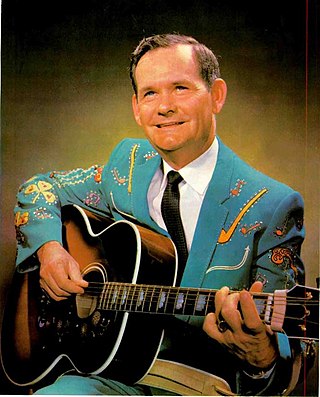
Hank Locklin was an American country music singer-songwriter. He had 70 chart singles, including two number one hits on Billboard's country chart. His biggest hits included "Send Me the Pillow You Dream On" and his signature "Please Help Me, I'm Falling". The latter also went to number eight on the Billboard Hot 100 pop music chart. Billboard's 100th anniversary issue listed it as the second most successful country single of the rock and roll era. It sold over one million copies, and was awarded a gold disc by the RIAA.
"City Lights" is an American country music song written by Bill Anderson on August 27, 1957. He recorded it on a small Texas label called TNT Records in early 1958 to little acclaim. The song was first cut by Anderson in 1957 at the campus of the University of Georgia. In June 1958, Ray Price recorded it and his version hit number 1 on the Billboard Hot Country Songs singles chart in August 1958. Mickey Gilley's version also hit number 1 in June 1975.

Connie Smith Sings Bill Anderson is the eighth studio album by American country singer Connie Smith. It was released in May 1967 by RCA Victor and featured 12 tracks. The album was dedicated to her mentor, Bill Anderson. It contained several songs made popular by Anderson himself, along with several tracks made popular by other performers. It also included the newly-recorded "Cincinnati, Ohio". Smith released her version as a single, which climbed into the top five of the American country songs charts. The album received favorable reviews following its release.
"Rose Garden" is a song written in 1967 by American singer-songwriter Joe South. It was first recorded by Billy Joe Royal on his 1967 studio album Billy Joe Royal Featuring "Hush". Versions by South himself and Dobie Gray appeared shortly after the original. Gray's version became a minor hit in North America in 1969.
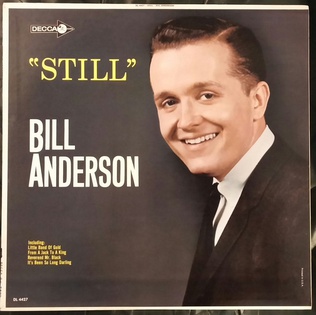
Still is a studio album by American country singer-songwriter Bill Anderson. It was released on June 17, 1963 on Decca Records and was produced by Owen Bradley. Still was Anderson's debut studio album as a recording artist after recording several singles for the Decca label. Two singles were included in the album. Its most successful was the title track, which became a crossover hit in 1963. It reached positions on the Billboard country, pop and adult contemporary charts. The album itself would also reach peak position on Billboard charts.
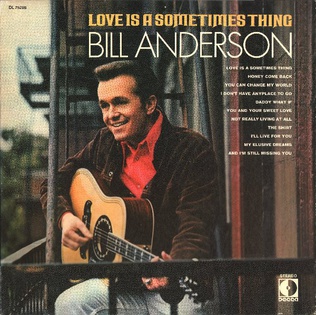
Love Is a Sometimes Thing is a studio album by American country singer-songwriter Bill Anderson. It was released in June 1970 on Decca Records and was produced by Owen Bradley. It was Anderson's fourteenth studio album since signing with the Decca label in 1958. Its only single, the title track, would become a major hit on the Billboard country chart in 1970. The album itself would also reach peak positions on the country albums chart following its release.

Bill Anderson Sings for "All the Lonely Women in the World" is a studio album by American country singer-songwriter Bill Anderson. It was released in May 1972 on Decca Records and was produced by Owen Bradley. It was Anderson's nineteenth studio recording to be released during his music career. The album included one song that became a major hit for him in 1972, the title track. The album would also reach positions on national music charts at the time.
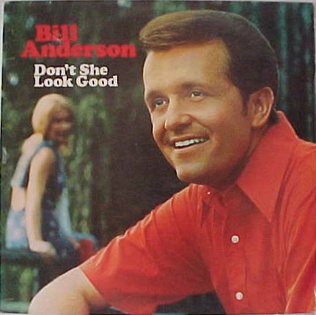
Don't She Look Good is a studio album by American country singer-songwriter Bill Anderson. It was released in November 1972 on Decca Records and was produced by Owen Bradley. The album was Anderson's twentieth studio recording to be issued. It was also his fourth studio album released in 1972. Two additional projects were collaborations with Jan Howard earlier in the year. The album's only single was the title track, which became a major hit on the country charts.

Bill is a studio album by American country singer-songwriter Bill Anderson. It was released in July 1973 on MCA Records and was produced by Owen Bradley. It was Anderson's first studio album to be released on the MCA label after Decca Records merged with the label. It was also his twenty first studio recording to be released and only album project to be issued in 1973. The album included three singles, two of which became number one hits in either the United States and Canada. The album itself also would reach peak positions on national publication charts.

Every Time I Turn the Radio On/Talk to Me Ohio is a studio album by American country singer-songwriter Bill Anderson. It was released in January 1975 on MCA Records and was produced by Owen Bradley.
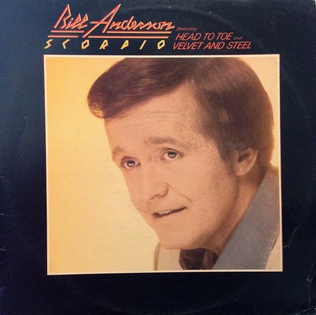
Scorpio is a studio album by American country singer-songwriter Bill Anderson. It was released in April 1977 on MCA Records and was produced by Buddy Killen. Scorpio was Anderson's 26th studio album as a recording artist and first album release of 1977. Another album would follow later in the year. The project produced two singles that became major hits.

Nashville Mirrors is a studio album by American country singer-songwriter Bill Anderson. It was released in 1980 on MCA Records and was produced by Buddy Killen. His 30th studio album, it was also Anderson's final album effort with his long-time record label. The album included three singles that reached minor positions on the Billboard country songs chart.
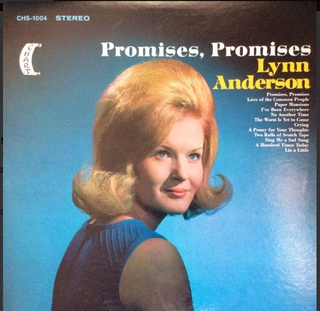
Promises, Promises is a studio album by American country music artist Lynn Anderson. It was released in December 1967 via Chart Records. It was co-produced by Lloyd Green and Slim Williamson. The album was Anderson's second studio album issued in her recording career and contained two singles that became top ten hits on the Billboard country chart. The album itself would also reach a high peaking positions on the Billboard country albums chart following its release.

Stay There 'Til I Get There is a studio album by American country artist Lynn Anderson. It was released in May 1970 on Columbia Records and was produced by Glenn Sutton. The album was Anderson's eighth studio recording as a music artist and was her first album for the Columbia label. The album's title track was released as a single and became her fifth top ten hit on the Billboard country chart. The album itself would also chart on a similar country survey.

No Love at All is a studio album by American country artist Lynn Anderson. It was released in August 1970 on Columbia Records and was produced by Glenn Sutton. No Love at All was Anderson's ninth studio recording as a music artist and the second released on the Columbia label. The album's only single, the title track, became a major hit on the Billboard country chart. The album itself also reached peak positions on a similar survey.
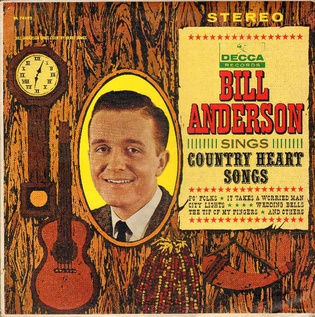
Bill Anderson Sings Country Heart Songs is a compilation album by American country singer-songwriter Bill Anderson. It was released in January 1962 on Decca Records and was produced by Owen Bradley. Despite it being a compilation, the project was Anderson's debut album release as a recording artist. It featured several of his early hits with the Decca label and included one song that would later be issued as a single in 1962.
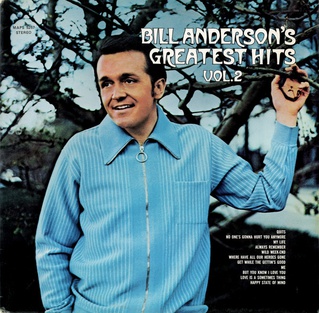
Bill Anderson's Greatest Hits, Vol. 2 is a compilation album by American country singer-songwriter Bill Anderson. It was released in September 1971 on Decca Records and was produced by Owen Bradley. The record was Anderson's fourth compilation released in his recording career and contained one single that became a major hit in 1971. The album itself included some his biggest hits from the era.
"That's What It's Like to Be Lonesome" is a song written and recorded by American country singer-songwriter Bill Anderson. It was released as a single in December 1958 via Decca Records and became a major hit. A similar version was released by American country artist Ray Price the same year via Columbia Records.

The singles discography of American country singer-songwriter Bill Anderson contains 84 singles, three promotional singles, 6 other charted songs and four music videos. After signing to Decca Records in 1958, Anderson released a series of early singles that became hits, reaching the top ten and 20. This included "That's What It's Like to Be Lonesome" (1958), "The Tip of My Fingers" (1960) and "Po' Folks" (1961). The following year, he reached number one on the Billboard Country and Western Sides chart with "Mama Sang a Song." In 1963, Anderson released his most commercially successful single, "Still." The song was his second number one country single and his first top ten hit on the Billboard Hot 100, climbing to number eight. His follow-up single, "8×10" reached similar crossover success. Anderson released 11 more top ten country hits during the rest of the decade. This included the number one singles "I Get the Fever" (1966) and "My Life " (1969). He also had a number one hit with Jan Howard called "For Loving You" in 1968. Anderson also had top ten hits with "I Love You Drops" (1965), "Happy State of Mind" (1968) and a cover of "But You Know I Love You" (1969).
References
- ↑ Whitburn, Joel (2004). The Billboard Book Of Top 40 Country Hits: 1944-2006, Second edition. Record Research. p. 24.
- ↑ on-line label scans of Loftin and Bragg